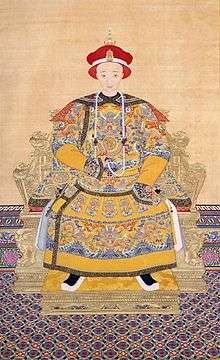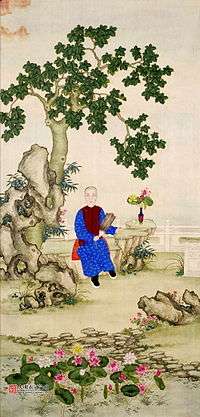Xianfeng Emperor
| Xianfeng Emperor | |||||||||||||||||
|---|---|---|---|---|---|---|---|---|---|---|---|---|---|---|---|---|---|
 | |||||||||||||||||
| 8th Emperor of the Qing Dynasty | |||||||||||||||||
| Reign | 9 March 1850 – 22 August 1861 | ||||||||||||||||
| Predecessor | Daoguang Emperor | ||||||||||||||||
| Successor | Tongzhi Emperor | ||||||||||||||||
| Born |
Aisin Gioro Yizhu (愛新覺羅 奕詝) 17 July 1831 (道光十一年 六月 九日) Chengjing Zhai, Old Summer Palace | ||||||||||||||||
| Died |
22 August 1861 (aged 30) (咸豐十一年 七月 十七日) Yanbozhishuang Hall, Chengde Mountain Resort | ||||||||||||||||
| Burial | Ding Mausoleum, Eastern Qing tombs | ||||||||||||||||
| Consorts |
| ||||||||||||||||
| Issue |
Princess Rong'an Zaichun | ||||||||||||||||
| |||||||||||||||||
| House | Aisin Gioro | ||||||||||||||||
| Father | Minning | ||||||||||||||||
| Mother | Lady Niohuru | ||||||||||||||||
| Xianfeng Emperor | |||||||||||
| Traditional Chinese | 咸豐帝 | ||||||||||
|---|---|---|---|---|---|---|---|---|---|---|---|
| Simplified Chinese | 咸丰帝 | ||||||||||
| Literal meaning | “Universal Prosperity” | ||||||||||
| |||||||||||
The Xianfeng Emperor (17 July 1831 – 22 August 1861), personal name Yizhu, was the ninth Emperor of the Manchu-led Qing dynasty, and the seventh Qing emperor to rule over China proper, from 1850 to 1861. During his reign the Qing dynasty experienced several wars and rebellions including the Taiping Rebellion, Nian Rebellion, and Second Opium War (Arrow War).
Family and early life
Yizhu was born in 1831 at the Old Summer Palace, eight kilometres northwest of Beijing. He was from the Manchu Aisin Gioro clan, and was the fourth son of the Daoguang Emperor. His mother was the Noble Consort Quan, of the Manchu Niohuru clan, who was made Empress in 1834, and is known posthumously as Empress Xiaoquancheng. Yizhu was reputed to have an ability in literature and administration which surpassed most of his brothers, which impressed his father, who therefore decided to make him his successor.
Early reign
Yizhu succeeded the throne in 1850, at age 19, and was a relatively young emperor. He inherited a dynasty that faced not only internal but also foreign challenges. Yizhu's reign title, Xianfeng, which means "Universal Prosperity", did not reflect the situation. In 1850, the first of a series of popular rebellions began that would nearly destroy the Qing dynasty. The Taiping Rebellion began in December 1850, when Hong Xiuquan, a Hakka leader of a syncretic Christian sect, defeated local forces sent to disperse his followers. Hong then proclaimed the establishment of the Taiping Heavenly Kingdom and the rebellion spread to several provinces with amazing speed. The following year, the Nian Rebellion started in North China. Unlike the Christian-influenced Taiping rebels, the Nian movement lacked a clear political program, but they became a serious threat to the Qing capital, Beijing, with the mobility of their cavalry-based armies. The Qing imperial forces suffered repeated defeats at the hands of both rebel movements.
Rebellions and wars
In 1853, the Taiping rebels captured Nanjing and for a while it seemed that Beijing would fall next; but the Taiping northern expedition was defeated and the situation stabilized. The Xianfeng Emperor dispatched several prominent mandarins, such as Zeng Guofan and the Mongol general Sengge Rinchen, to crush the rebellions, but they only obtained limited success. The biggest revolt of the Miao people against Chinese rule in history started in 1854, and ravaged the region until finally put down in 1873. In 1856, an attempt to regain Nanjing was defeated and the Panthay Rebellion broke out in Yunnan.

Meanwhile, an initially minor incident on the coasts triggered the Second Opium War. Anglo-French forces, after inciting a few battles (not all victories for them) on the coast near Tianjin, attempted "negotiation" with the Qing government. The Xianfeng Emperor, under the influence of his Noble Consort Yi (later Empress Dowager Cixi), believed in Chinese superiority and would not agree to any colonial demands. He delegated Prince Gong for several negotiations but relations broke down completely when a British diplomat, Sir Harry Parkes, was arrested during negotiations on 18 September.
The Anglo-French invasion clashed with Sengge Rinchen's Mongol cavalry on 18 September near Zhangjiawan before proceeding toward the outskirts of Beijing for a decisive battle in Tongzhou District, Beijing. On 21 September, at the Battle of Eight-Mile Bridge, Sengge Rinchen's 10,000 troops, including his elite Mongol cavalry, were completely annihilated after several doomed frontal charges against the concentrated firepower of the Anglo-French forces, which entered Beijing on 6 October.
On 18 October 1860, the British and French forces went on to loot and burn the Old Summer Palace and Summer Palace. Upon learning about this news, the Xianfeng Emperor's health quickly deteriorated.
During the Xianfeng Emperor's reign, China lost part of Manchuria to the Russian Empire. In 1858, according to the Treaty of Aigun, the territory between Stanovoy Mountains and Amur River was ceded to Russia, and in 1860, according to the Treaty of Beijing, the same thing happened also to the area east of Ussuri River. After that treaty, the Russians founded the city of Vladivostok in the area they had annexed.
While negotiations with the European powers were being held, the Xianfeng Emperor and his imperial entourage fled to Jehol province in the name of conducting the annual imperial hunting expedition. As his health worsened, the emperor's ability to govern also deteriorated, and competing ideologies in court led to the formation of two distinct factions — one led by the senior official Sushun and the princes Zaiyuan and Duanhua, and the other led by Noble Consort Yi, who was supported by the general Ronglu and the Bannermen of the Yehe Nara clan.
Death
The Xianfeng Emperor died on 22 August 1861, from a short life of overindulgence, at the Chengde Mountain Resort, 230 kilometres northeast of Beijing. His successor was his surviving six-year-old son, Zaichun. A day before his death, the Xianfeng Emperor had summoned Sushun and his supporters to his bedside and gave them an imperial edict that dictated the power structure during his son's minority. The edict appointed eight men – Zaiyuan, Duanhua, Jingshou, Sushun, Muyin, Kuangyuan, Du Han and Jiao Youying – as an eight-member regency council to aid Zaichun, who was later enthroned as the Tongzhi Emperor.[1] Xianfeng gave the eight men the power of regency, but their edicts would have to be endorsed by Noble Consort Yi and Empress Consort Zhen. By tradition, after the death of an emperor, the emperor's body was to be accompanied to the capital by the regents. Noble Consort Yi and Empress Consort Zhen, who were now known as Empress Dowagers Cixi and Ci'an travelled ahead to Beijing and planned a coup with Prince Gong that ousted the eight regents. Empress Dowager Cixi then effectively ruled China over the subsequent 47 years as a regent.
The Xianfeng Emperor was interred in the Eastern Qing Tombs, 125 kilometres/75 miles east of Beijing, in the Ding (定; lit. "Quietude") mausoleum complex.
Legacy
The Qing dynasty continued to decline during the reign of the Xianfeng Emperor. Rebellions in the country, which began the first year of his reign, would not be quelled until well into the reign of the Tongzhi Emperor and resulted in millions of deaths. The Xianfeng Emperor also had to deal with the British and French and their ever-growing appetite to expand trade further into China. The Xianfeng Emperor, like his father, the Daoguang Emperor, understood very little about Europeans and their mindset. He viewed non-Chinese as inferior and regarded the repeated requests by the Europeans for the establishment of diplomatic relations as an offence. When the Europeans introduced the long-held concept of an exchanged consular relationship, the Xianfeng Emperor quickly rebuffed the idea. At the time of his death, he had not met with any foreign dignitary.
Despite his tumultuous decade of reign, the Xianfeng Emperor was commonly seen as the last Qing emperor to have held paramount authority, ruling in his own right. The reigns of his son and subsequent successors were overseen by regents, a trend present until the fall of the Qing dynasty.
Family
- Parents:
- Minning (宣宗 旻寧; 16 September 1782 – 26 February 1850)
- Empress Niohuru (孝全成皇后 鈕祜祿氏; 24 March 1808 – 13 February 1840)
- Consorts and Issue:
- Posthumous empress Sakda (孝德顯皇后 薩克達氏; 12 April 1831 – 24 January 1850), seventh cousin once removed
- Empress Niohuru (孝貞顯皇后 鈕祜祿氏; 12 August 1837 – 8 April 1881)
- Empress dowager Yehe-Nara (孝欽顯皇后 葉赫那拉杏貞; 29 November 1835 – 15 November 1908), personal name Xingzhen
- Zaichun (穆宗 載淳; 27 April 1856 – 12 January 1875)
- Second rank consort Tatara (莊靜皇貴妃 他他拉氏; 2 April 1837 – 26 December 1890)
- Princess Rong'an (榮安固倫公主; 20 June 1855 – 5 February 1875)
- Second rank consort Tunggiya (端恪皇貴妃 佟佳氏; 3 December 1844 – 7 May 1910)
- Third rank consort Xugiya (玫貴妃 徐佳氏; 1835 – 20 December 1890)
- Prince Min (憫郡王; 19 March 1858)
- Third rank consort Socoro (婉貴妃 索綽絡氏; 1835 – 20 June 1894)
- Fourth rank consort Yehe-Nara (璷妃 葉赫那拉氏; 2 March 1841 – 15 May 1895)
- Fourth rank consort Wang (吉妃 王氏; 1846 – 12 November 1905)
- Fourth rank consort Cahala (禧妃 察哈喇氏; 4 October 1842 – 26 June 1877)
- Fourth rank consort Zhang (慶妃 張氏; 25 October 1840 – 15 June 1885)
- Fifth rank consort Wugiya (雲嬪 武佳綺雲; d. 11 January 1856), personal name Qiyun
- Fifth rank consort Irgen-Gioro (容嬪 伊爾根覺羅氏; 1837 – 21 June 1869)
- Fifth rank consort Yehe-Nara (璹嬪 葉赫那拉氏; 1840 – 9 May 1874)
- Fifth rank consort Yehe-Nara (玉嬪 葉赫那拉氏; 14 August 1843 – 26 December 1863)
See also
| Wikisource has original works written by or about: Xianfeng |
| Wikimedia Commons has media related to Xianfeng Emperor. |
- Chinese emperors family tree (late)
- Second Opium War (1856–1860)
- Treaties of Tianjin (1858)
- Convention of Peking (1860)
References
- ↑ Wakeman, Frederic. The fall of Imperial China.
Sources and literature
- Daily Life in the Forbidden City, Wan Yi, Wang Shuqing, Lu Yanzhen ISBN 0-670-81164-5".
- Qing dynasty Wenzong’s veritable records (清文宗實錄).
- Royal archives of the Qing dynasty (清宮檔案).
- Qing imperial genealogy(清皇室四譜).
- webpagina: http://www.royalark.net/China/manchu14.htm,%5Bpermanent+dead+link%5D gaat over de stamboom van de Aisin Gioro stam.
- Draft history of the Qing dynasty. 《清史稿》卷二百十四.列傳一.后妃傳.
Books about Empress Dowager Cixi:
- Sterling Seagraves "Dragon Lady" ISBN 0-679-73369-8
- Maria Warners "The Dragon Empress: Life and Times of Tz'u-Hsi, 1835 – 1908, Empress of China". ISBN 0-689-70714-2
- Anchee Min "Empress Orchid" ISBN 978-0-618-06887-6
Xianfeng Emperor Born: 17 July 1831 Died: 22 August 1861 | ||
| Regnal titles | ||
|---|---|---|
| Preceded by The Daoguang Emperor |
Emperor of China 1850–1861 |
Succeeded by The Tongzhi Emperor |